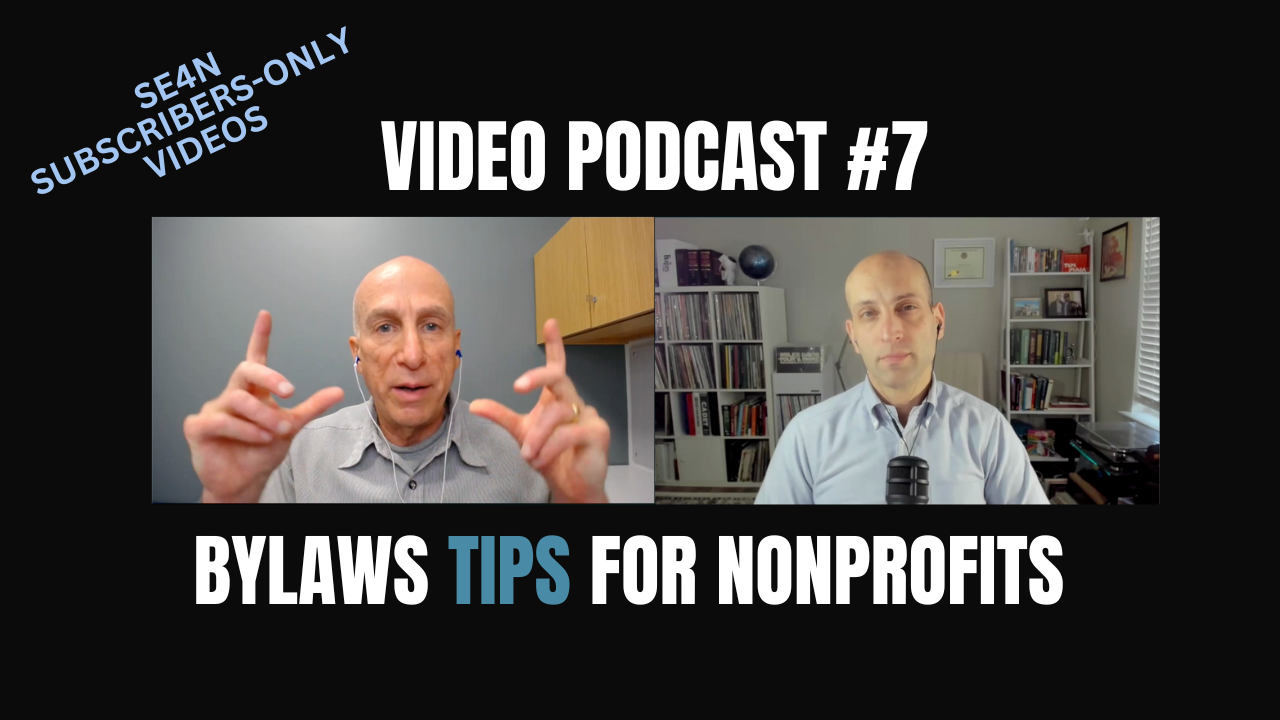
Blog.
Most Recent Posts

VIDEO Q&A for Subscribers: August 2025
Ben and Mike answer questions from subscribers about the rights of members to access a membership organization's documents, whether small organizations should have an audit committee, addressing auditor findings, and balancing privacy concerns with reporting and disclosure requirements.

Q&A #176 – Can a nonprofit appoint an interim Board Chair to replace a resigning chair?
An organization’s Bylaws and applicable state nonprofit corporation laws will determine whether a Board Chair can be appointed for less than a full term, but there is usually no restriction against appointing an “interim” Board Chair who serves on a temporary basis until a longer-term successor is chosen. However, it is important to be aware that interim directors and officers are subject to the same fiduciary duties and other responsibilities as other directors and officers.

VIDEO PODCAST: Bylaws Tips for Nonprofits
Ben and Mike discuss tips and recommendations to help nonprofit organizations build better Bylaws, such as establishing a schedule for regular review of the Bylaws, complying with state law requirements, addressing Board meeting formalities, notice, and quorum requirements, clarifying term limits language, and more.

Five Nonprofit Bylaws Issues That Are Often Overlooked
All nonprofit organizations should regularly review and assess their Bylaws to ensure this key governing document complies with the law and is optimally aligned with the organization’s governance needs and operational practices. The following are five common Bylaws oversights to look for when doing your organization’s next Bylaws review.

Drafting Dissolution Language for the Articles of Incorporation
The “dissolution” clause in a nonprofit organization’s Articles of Incorporation is one of the key provisions required to qualify for 501(c)(3) status. This language must require that the organization’s assets remain dedicated to 501(c)(3) exempt purposes in the event it dissolves. While this basic principle is easy to understand, many overlook the significance of subtle differences in how to approach drafting this language.

Q&A #140 – How do nonprofits report a name change to the IRS?
A formal name change must be reported on the organization’s next Form 990 or 990-EZ by checking the “name change” box in Column B on the left side at the top of page 1 and including a state-certified copy of the amendment to the organization’s Articles of Incorporation. Form 990-N filers must instead send a letter or fax with this supporting documentation to the IRS Exempt Organizations Division.

Q&A #139 – Does a nonprofit name change require an amendment to the governing documents?
A nonprofit organization may generally change its name either by amending its Articles of Incorporation and other governing documents, or, alternatively, by registering a “trade name” in the applicable states, often referred to as a fictitious name, “doing business as” name, or “DBA.” While amending the governing documents is not required, it is usually the recommended approach to minimize confusion.

Q&A #136 – Is good cause required to remove a nonprofit Board member?
A nonprofit organization’s Bylaws generally determine whether “cause” is required to remove a Board member and, if so, what type of conduct or inaction constitutes cause for removal. The applicable state nonprofit corporation statute may have some rules and guidelines related to the removal of directors, but these laws usually defer to the organization’s Articles of Incorporation and Bylaws, so checking your own governing documents is always the first step.

Q&A #131 – Do nonprofit committees need to be listed in the Bylaws?
As a general rule, it is not strictly necessary to list or reference every committee in a nonprofit organization’s Bylaws unless there are provisions in the organization’s Articles of Incorporation or Bylaws specifying this requirement. Rather, a Board motion or resolution is usually sufficient to form a new committee, so long as proper records of the Board action are maintained.

Drafting Purpose and Mission Language for the Articles of Incorporation
The “purpose” clause is one of the most important provisions in a nonprofit organization’s Articles of Incorporation. This language satisfies a core legal requirement while also establishing the organization’s main mission and permissible range of activities. However, it can be deceptively challenging to get this language right.

Q&A #114 – What happens if a nonprofit fails to hold regular Board meetings?
Failure to hold regular Board meetings as required in the organization’s Bylaws is a problem but usually does not trigger immediate consequences by itself. However, this is often a sign of deeper neglect or compliance failures inside the organization and will not reflect well on the Board members in the event of an internal dispute, lawsuit, government investigation, or financial statement audit.

Q&A #113 – What happens when a nonprofit Board vote is tied?
Unless an organization’s Articles of Incorporation or Bylaws provide otherwise, a tie or deadlocked vote simply means that the proposed motion failed to reach the required level of approval to pass. Some organizations provide a mechanism in their Bylaws to resolve matters that are deadlocked (such as designating one or more persons to break the tie), but this is unusual. Thus, the result of a tie is generally no different than if a majority voted against the motion.

Q&A #112 – Can a chairperson unilaterally suspend a nonprofit organization’s Bylaws?
As discussed in Q&A #49, a nonprofit organization’s Bylaws generally cannot be “suspended,” but rather must follow the formal process for “amendment” set forth in the Bylaws themselves, the organization’s Articles of Incorporation, and the applicable state nonprofit corporation statute. It is possible, but extremely unlikely, that state law and your organization’s governing documents would permit the Bylaws to be amended unilaterally by the chairperson.

Q&A #97 – What to do when the Bylaws are ambiguous?
It is nearly impossible to eliminate all ambiguity from the Bylaws of a nonprofit organization, so sometimes interpretive questions will arise that truly do not have a clear answer. Fortunately, courts will often defer to the Board’s interpretation of ambiguous Bylaws if the Board can show that the interpretation was reasonable and made in good faith. While the level of deference will vary depending on the applicable jurisdiction, this is a good standard to aim for regardless.

Q&A #93 – Are term limited Board members ever eligible to rejoin the Board?
The question of whether Board members are eligible to rejoin the Board after a period of time has lapsed is one of the most important issues that should be addressed in the Bylaws of any nonprofit that has term limits for its Board of Directors. If the Bylaws are truly silent to this issue and do not specify when term limited Board members become eligible to serve again, then the Bylaws should probably be interpreted as not allowing these Board members to rejoin. Amending the Bylaws to clarify this issue would be advisable.